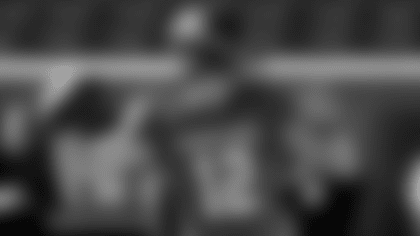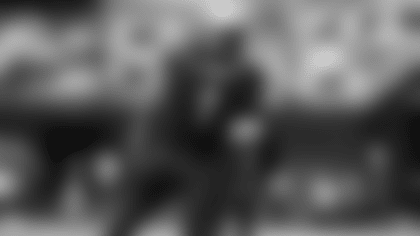Nobody sufficiently peeved the Answer Man this week (like Todd with his dual corrections in Volume 12) or sent me into paroxysms of delight (like Richard with his mention of Chad Morton's genius in Volume 11.) Therefore, I've got no opening monologue this week about the alternating pains and joys of my job.
That's fitting for the bye week, anyway. Everything sort of settles into a relaxed ease during this week…it's somewhat bizarre, really, given the hyperactivity and underlying stress of the rest of the NFL season. The team isn't exactly taking a week off – coaches are still working long hours breaking down film and players are due in twice this week for 'bonus' practices – but without a game to prepare for this weekend there are a lot fewer daily responsibilities.
For a few days at least.
Therefore, before diving back into the e-mailbag, the Answer Man is going to delight you, dear readers, with a few random facts. No connections between the notes, no trivia contest, no specific agenda…just a few things Buccaneer-related that I've recently found interesting. Then it's on to your questions. I'll also be posting a second column later in the week.
Did You Know…
- That Torrie Cox is the NFL's top kickoff return man at the moment. When the Bucs next take the field, they'll be challenged by the player many consider the league's most dangerous returner, Kansas City's Dante Hall. However, it is the Bucs who employ the NFL's current leader in kickoff return average, as Cox has a mark of 28.9 yards per return on 15 runbacks. That barely edges out Eddie Drummond of Detroit, who has a 28.3-yard average. Nobody else in the NFL is above 26.3. Hall is currently well down the list at 20.2, but any coverage unit that takes those numbers at face value will likely regret it. * That if the Bucs can crack the scoreboard against Kansas City (and its 26th-ranked scoring defense) after the bye week, it will mark the 80th straight game in which Tampa Bay has avoided a shutout (including playoffs). The last shutout pitched by a Buccaneer opponent was the 45-0 pasting the Oakland Raiders, then coached by Jon Gruden, put on them on December 19, 1999. Eighty games is the exact equivalent of five seasons, but it's not the longest such streak in franchise history. From the 14th game of the 1985 season through the seventh game of 1991, the Bucs went 89 games without being shutout. * That, while Tampa Bay's offense has had its ups and downs this season (more ups than downs in recent weeks), in one category it has been outstanding all season: passing accuracy. Through seven games, the Bucs have yet to finish a contest with a completion percentage below 60%. The 'low' was 61.1% at Oakland; the Bucs have been at 65% or better in four of seven games. In contrast, Tampa Bay's defense has not allowed a single opponent to complete more than 60% of its passes. The Rams hit that 60% on the nose, but four of the other six Buc opponents have been at 50% or worse. * That Tampa Bay has never played at Buffalo's Ralph Wilson Stadium. The Bucs have played at Houston's Reliant Stadium twice even though it only opened in 2002, and they've already visited new and relatively new parks in Philadelphia, Cincinnati, Tennessee, Baltimore, Detroit and St. Louis. But they've never played in Buffalo (shucks). The Bucs lead the all-time series with the Bills, 5-2, with all seven games taking place in Tampa. * That the Bucs' defense has only allowed eight of 50 third downs to be converted from seven yards away or further. That 16% success rate for opponents trying to convert medium and long-range third downs, as opposed to a 54.9% conversion rate from six yards or closer, gives a clear indication of why the Bucs feel it is critical to stop the running game on first and second down.
Okay, that's it for the trivia today. Before I know it, this bye week will be over and it will be back to hyperactivity around here. So, while time permits, onto the mailbag…
**
1a. Brian Simonet of Brandywine Maryland asks:
I was reading your last article and couldn't help myself. Honestly I have never heard of a fair catch kick. Could you elaborate?
and
1b. Chris Mink of Tampa, Florida follows up with:
**"The holder of a fair catch kick may be beyond it.
Now, if anybody out there asks me what a fair catch kick is, I might hurl myself off a bridge." (Answer Man, Vol. 12)
I am sorry I had to ask this, and I hope you don't hurl yourself off a bridge, but that just doesn't sound right to me. The only time a ball is fair caught is on a punt return and there is no holder on punts so this confuses me. This sounds like an antiquated rule that just hasn't been edited yet.**
Answer Man: Does no one out there care about the Answer Man? I'd like to say that Brian and Chris were the only two to ignore my plea and ask about the fair catch kick, but I can't. There are apparently dozens of Buccaneer fans who have no qualms with the thought of the Answer Man dangling his toes over the edge of the Sunshine Skyway.
Sadists. Listen, I may wear a cape, but I can't fly.
Well, the win over Chicago on Sunday was an emotional lift, and several nice e-mails over the past five days (thanks, Roy Padrick of Titusville, Florida and Carrie Lessing of Jacksonville, Florida) filled the Answer Man with warm feelings. So I guess I'll hold onto this mortal coil for awhile longer and take a stab at deciphering this 'fair catch kick' oddity.
Even if it means – sigh – another hour with my nose in the NFL rulebook.
(By the way, if the Answer Man may digress, one Larry G. of somewhere 'close to Washington D.C.' would like to know, Where can one obtain a copy of, as you call it, "that mind-numbing tome we've all become so familiar with, the NFL Rule Book."?
Larry, we can only guess, is having a little trouble getting to sleep at night. Well, Answer Man happens to know that it is available at both Barnes & Noble and Borders, so if you're one of the lucky few that has one of those stores near your home – ha ha, that's a little Answer Man humor – then you're in luck. It's in more of a handbook size and it's got little glossy touches like a picture of Tom Brady on the cover, but the words inside are the same coma-inducing ones that grace the publication on my desk. Also, I just did a quick internet search and saw it available for purchase on Amazon.com, booksamillion.com, etc.)
Back to the subject. First off, Chris, I would agree that it's an antiquated rule, by the second definition of antiquated in Webster's Dictionary: 'out of style and fashion.' However, it is not antiquated by the first definition: 'obsolete.' NFL teams are free to kick after a fair catch now just as they've always been. The thing is, it would take just the right combination of circumstances to ever make it a viable strategy.
Let's start by explaining just what this beast is. This time, I'm going to spare you the exact wording from the NFL rulebook because it gives me a splitting headache just to read it, even after I've had it explained to me by live humans with normal speech patterns.
Certainly, you all know what a fair catch is: A player waiting to return a kick can signal for a fair catch by waving one arm over his head; he must then be given room to catch the ball, but he cannot advance it after the catch.
Now, here's where it gets tricky. Or antiquated, depending upon your point of view. Supposedly, the referee then asks the team captain if, after the fair catch, he would like to run a play from scrimmage or attempt a free kick from the yard line of the catch. In the NFL, that must be either a drop kick or a placekick without a tee (reportedly, a tee can be used in high school.) By the way, to execute a drop kick, you drop the ball on the ground and kick it either as it hits the ground or as it begins to bounce back up. A very Australian-Rules thing to do.
Let's recap in plain language: You call for a fair catch. Rather than run a play, you may choose to execute a free kick from the line of scrimmage established by the fair catch. And by free kick, we mean a kickoff-type kick in which the defense is not on the line of scrimmage.
Now, the Answer Man personally believes that the last time an official actually asked a team captain if he wanted to kick or run a play after a fair catch, that captain was probably wearing a leather helmet. Still, the rule exists and, believe it or not, players and coaches in the NFL know about it. Just for fun, I walked through the football offices on Tuesday morning and asked a sampling of three coaches, two players and three scouts if they knew what a 'fair catch kick is.' Seven answered correctly (names withheld to protect the innocent). These eight quiz men were chosen mostly on the 'who-happens-to-be-standing-around' criteria, but I think it's fair to say that the fair catch kick rule, though antiquated, is still taught in NFL 101.
So when would this little gambit ever be put into play? Here's a possible scenario:
Team A has a one-point lead and possession of the ball at their own one-yard line. There are three seconds left in the game, but it's fourth down and Team A is going to punt, fearing that a kneel-down will leave a second left on the clock and a 'run-around-until-the-clock-runs-out' strategy exposes the risk of a sack in the end zone.
Now, since the clock starts on the snap on a punt, the act of kicking the ball away is likely to take up the remainder of the game time. The receiving team, Team B, would be forced to run the punt back for a touchdown in order to avoid defeat, right?
Well, maybe not. Let's say the punt comes down at the 40-yard line. If the return man executes a fair catch, Team B could elect to use the fair catch kick option. League rules specifically state that the receiving team can still try a kick after time expires, but they cannot run a play from scrimmage. And here's the beauty of it: Team B can choose to kick from a kickoff formation, without a defense challenging them at the line of scrimmage. In addition, the kick would be from the spot the ball was caught, not from seven or eight yards back after the snap. So, if the return man caught the ball at the 40, we're talking about a 50-yard field goal, without any potential blockers in the way.
Whew! Do we have room for any more questions? Sure we do…that's what the scroll bar is for! Next up…
**
- Aaron Toms of Orlando, Florida asks:
Is it possible for two opposing teams to wear their dark uniforms? For example, if we played the Saints in New Orleans, and they decided to wear their all black uniforms would we be able to wear our red & pewter unis since there would be no confusion between the teams colors?
Answer Man: Nope.
Just to clarify, you can wear whatever color pants you would like; it's the jersey that's the key.
As we discussed in Volume 10, the home team determines the jersey colors of every game, with each team submitting its season-long list of choices before the campaign begins. If the home team chooses to wear a dark-colored jersey, the visitors have to go light, and vice versa. Thus, you usually see the Bucs in their white jerseys early in the year to force opponents to wear dark ones in the Florida heat.
The actual distinction is between 'dark' and 'light,' not 'colors' and 'white,' but it works out about the same in practice. Most teams' light jerseys are indeed white, though the Carolina Panthers, for instance, have used an alternate, light-blue jersey as light. But you will never see the Saints' black against the Bucs' red, or the Bears' dark blue against the Eagles' green.
**
- Joe Mueller of St. Petersburg, Florida:
Can you submit a birthday wish to be displayed on the "videotron" during the game?
Answer Man: The Answer Man admits to a slight bit of editing above, putting quotation marks around "videotron." The Bucs call it BucVision, with the actual displays known as videoboards. And obviously, we've all heard the generic term, Jumbotron (actually, that's a trademark of the Sony corporation, but it's gained a generic usage like Kleenex, Thermos and Xerox). But I think Joe may be responsible for the first-ever usage of "videotron," and frankly, I like it.
No matter what you want to call it, Joe, the answer is yes. You can purchase a message to be displayed on BucVision during a game. It must be submitted by noon on the Thursday before the game in question. To find out more about pricing and how to place an order, please contact the team's Special Events Department at 1-813-870-2700.
And my birthday, by the way, is December 5.
**
- AJ Alvarez of Wesley Chapel, Florida asks:
Answer Man, please help me: I drowning in the mad waves of salary cap confusion! Can you explain the details of the salary cap as is relates to players who are cut, put on one of the "inactive" lists, traded, etc. What's an "injury settlement" all about and how does it affect the salary cap? Also, If a player is suspended by the league without pay, does that affect the salary cap? How about if a player signs with the team after the beginning of the season and is cut a few weeks later, what portion of his salary counts towards the cap?
Answer Man: The salary cap is an exhausting subject and, apparently to AJ, a nautically dangerous one, as well. We could go on and on about it. And on and on. And there would be a word for that: Boring.
But we'll answer your questions one by one in very brief fashion, AJ. Don't worry, somebody else will write in with another gradation of the salary cap question next week.
- "Players who are cut, put on one of the "inactive" lists, traded, etc." – A player who is released is not paid the rest of his annual salary for the remainder of the year, and that remaining salary comes off the cap. However, any remaining portion of his prorated signing bonus accelerates to that moment, as we've discussed before and won't go deeply into again. Players on the various reserve lists (IR, PUP, etc.) do get their salaries and do count against the cap. A player who is traded takes the remainder of his contract and its cap hit to his new team, except, again, for the prorated signing bonus part. * "If a player is suspended by the league without pay, does that affect the salary cap?" – Yes, it does. The salary that is lost during that suspension DOES NOT count against the cap. Neither does it count if a player under contract is holding out. * "How about if a player signs with the team after the beginning of the season and is cut a few weeks later, what portion of his salary counts towards the cap?" – Setting aside, again, any signing bonus, the portion of the player's salary that counts against the cap is the portion he was paid while he was on the team, pure and simple.
I hope that served as an adequate flotation device, AJ.
**
- Tony Vaughn of Oklahoma City, Oklahoma asks:
Hey Answer Man. Do you think Michael Clayton has a good chance to be this year Rookie WR of the Year.
Answer Man: Well, that comes dangerously close to the sort of topic I don't touch, those asking for my opinions on the capabilities of our players and coaches. But the Answer Man spent a few formative years in Norman, Oklahoma and still counts himself a Sooner fan, so we'll give this one a try, Tony.
First off, we noticed that you worded it, "Rookie WR of the Year" (emphasis added). There is no such specific award, so we're going to assume you just meant Rookie of the Year. Furthermore, we have to choose which rookie award we're going with, since various publications like The Sporting News and Sports Illustrated will be weighing in with their own selections. We're going to focus on the Associated Press awards, since they've been around since the 1950s and they're the ones recognized in the NFL's own Record & Fact Book.
AP actually picks an Offensive Rookie and Defensive Rookie of the Year, which means Clayton won't have to compete against the likes of Washington's Sean Taylor, Seattle's Michael Boulware or Chicago's Tommie Harris.
And I suppose we can look at it semi-objectively. Who are the last 10 Offensive ROYs in the NFL, for instance?
| Year | Player | Pos. | Team |
| 1994 | Marshall Faulk | RB | Indianapolis |
| 1995 | Curtis Martin | RB | New England |
| 1996 | Eddie George | RB | Houston |
| 1997 | Warrick Dunn | RB | Tampa Bay |
| 1998 | Randy Moss | WR | Minnesota |
| 1999 | Edgerrin James | RB | Indianapolis |
| 2000 | Mike Anderson | RB | Denver |
| 2001 | Anthony Thomas | RB | Chicago |
| 2002 | Clinton Portis | RB | Denver |
| 2003 | Anquan Boldin | WR | Arizona |
To the Answer Man, the thing that stands out most on this list is the preponderance of running backs – eight of 10 over the last decade. In fact, in the 47 years that the Offensive Rookie of the Year has been awarded by AP, it's gone to a running back 35 times. And the lack of quarterbacks on the above list is no recent trend; amazingly, no quarterback has ever won the award. By the way, the only tight end ever to win the award was Mike Ditka, in 1961. It has also never gone to a lineman.
So if there's a slant toward running backs among the voters, than that's a disadvantage for Clayton. However, Boldin brought it home for the receivers last year after catching 101 passes for 1,377 yards. Clayton, who leads all NFL rookies in both categories, is on pace for 85 receptions and 1,154 yards.
In addition, this appears to be a weak year for running back candidates. There isn't a single rookie back in the top 20 on the league's rushing list through seven weeks. Minnesota's Mewelde Moore, who leads all rookies with 347 rushing yards, may not retain a starting job when Michael Bennett returns to health. St. Louis's Steven Jackson, next on the list with 260 yards, will be sharing carries as long as Faulk is around.
However, this might be the year that a quarterback finally wins the award. Pittsburgh's Ben Roethlisberger is off to a fabulous start, winning his first four games and compiling a 100.1 passer rating that is second only to Peyton Manning's 116.2 in the AFC.
So, trying not to get too partisan about it, we'd say Clayton has a fighter's chance at the award, if his production remains relatively consistent. One note: If he does win, he'd join Dunn as the only two Bucs ever to take that prize home.
**
5a. Don Denno of Waynesville, Missouri asks:
Here I am, a Buccaneers fan stuck in the middle of Missouri, and the Flash Intro I looked forward to the most (against the Rams) never materialized. What happened?
and
5b. Jamie Gendreau of Rifle…that's right, just Rifle…asks:
Last year I could pull up the previous intros. I wanted to convert some fans and show them previous intros this year but I cannot find them. Are they still available? Thanks.
Answer Man: Starting with Jamie first, yes, they are still available. There is an archive of all our popular intros here in the Multimedia section. You will also find links to the Intros from 2003 and 2002 on that page.
As for Don's e-mail, we got a number of similar questions about the St. Louis week (one visitor wondered where the Intros were for the last two weeks, but there most definitely was one for the Chicago game: The Grudefather).
Unfortunately for Don and others who have come to love that weekly dash of humor and braggadocio on Buccaneers.com, there indeed was no intro for the week leading up to the Monday night game. This was no editorial decision, as we've had good fun with the Rams games in the past. This was simply the by-product of an illness on the Buccaneers.com staff.
But everybody's feeling good again, and as you saw before the Chicago game, our Flash-master is back in fine form. Count on movies for the rest of the year. And, Don, we're sorry. About the missing intro and about being surrounded by Rams fans.
**
- Jack Bentley of West Valley Utah asks:
When does Josh Savage get to play this year, if at all?
Answer Man: Good ol' Jack here is a fan of the Utes, we'd bet. His question is in regards to rookie defensive end Josh Savage, the undrafted player out of the University of Utah who was one of the Bucs' biggest surprises in training camp.
Savage beat the odds to make the Bucs' 53-man roster in his rookie season. However, through the first six weeks of the season, he was put on the game-day inactive list as the Bucs went with Simeon Rice, Greg Spires and Dewayne White as their three active ends.
That changed this past week, however, when both of the team's reserve defensive tackles, Ellis Wyms and Damian Gregory, went to injured reserve. With no other interior depth, the Bucs activated Savage against the Bears and asked him, White and Corey Smith – all defensive ends – to prepare to help out inside.
Savage played approximately a half-dozen snaps against Chicago. He did not register any stats, but he did get his feet wet in the NFL. Savage may get additional opportunities to show his stuff after the bye week, in the final nine weeks of the regular season.


































